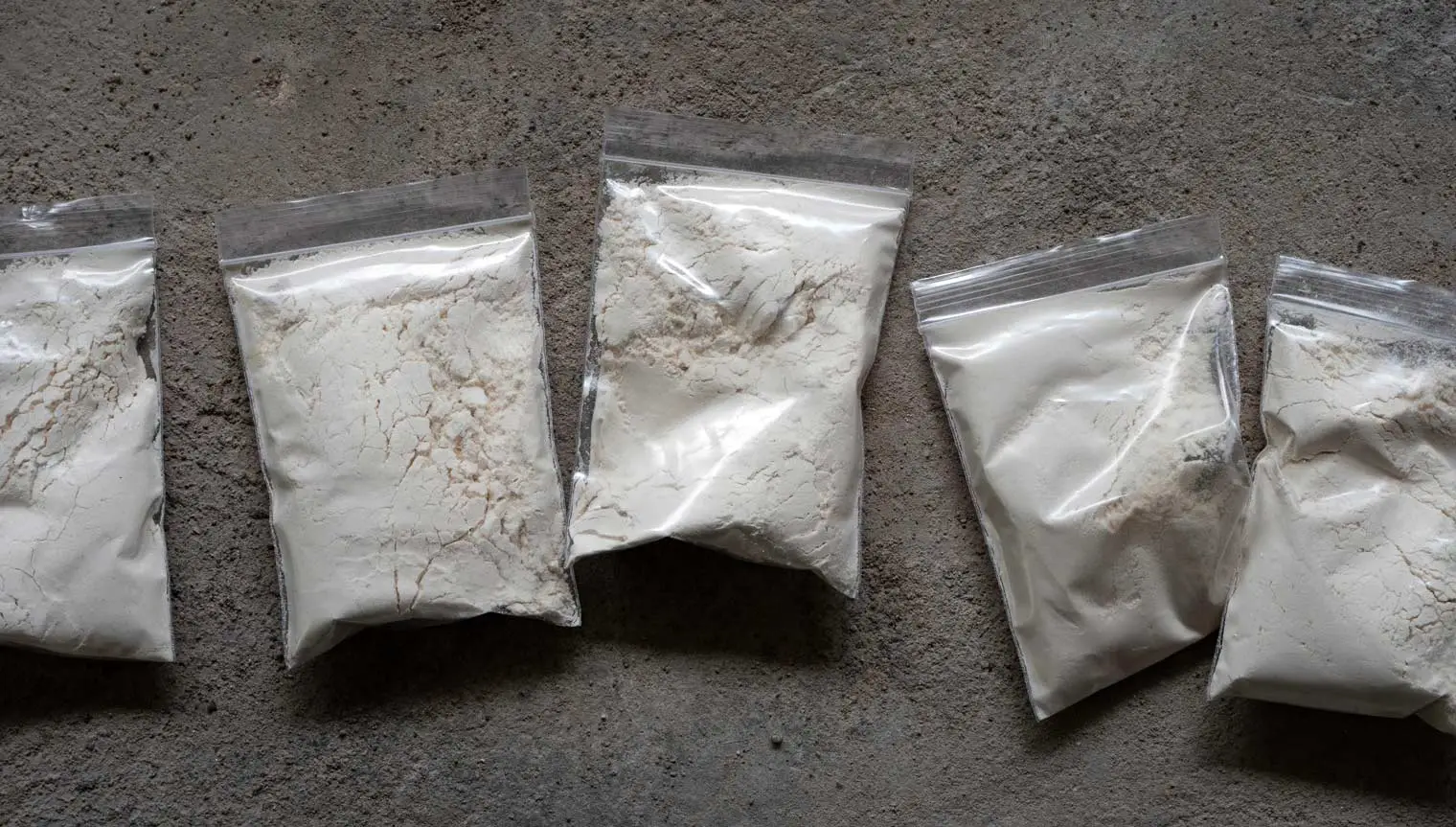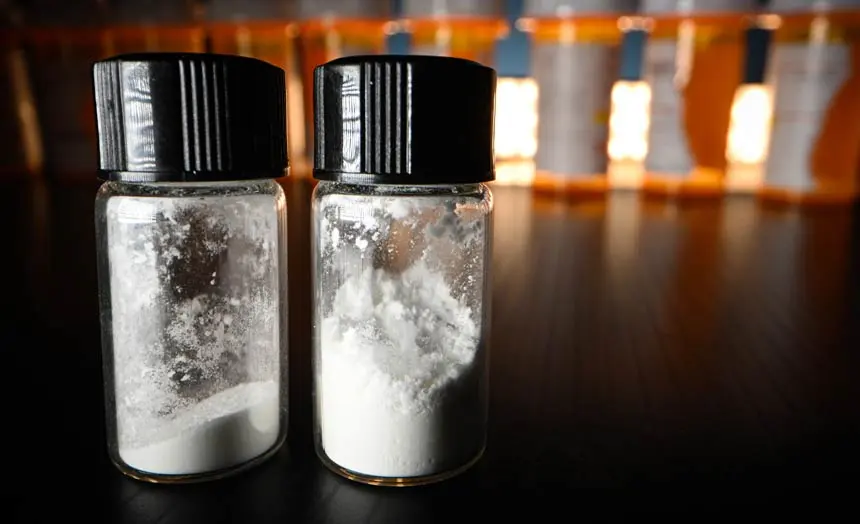

Table of Contents
Fentanyl is a synthetic opioid painkiller initially prescribed but has gradually become popular in the illicit drug market. Fentanyl is an opioid with morphine-like effects, but it is 50-100 times more potent.
Since it has a high potency, illicit fentanyl is frequently blended with other drugs to maximize the increased risk for addiction while reducing the dealer’s costs.
If you think a loved one may be struggling with fentanyl, use our guide to uncover common fentanyl street names and slang now!


Because of its origins as a prescription painkiller, fentanyl is commonly known by its brand name. Fentanyl’s distribution channels are diverse, and the drug comes in varying brand names, such as:
Fentanyl’s extreme potency and addiction potential make it popular on the black market, despite the drug’s many acceptable medical uses. Some common fentanyl street names for fentanyl include:
The drug’s name has inspired some of its most common slang names. According to the Drug Enforcement Administration (DEA), there are several slang terms for fentanyl, including:
Although a Belgian scientist developed fentanyl, the origins of opioids may be traced back to China, where locals first cultivated poppy plants. As a result, many of the names have a Chinese theme.
Fentanyl is available in various shapes and sizes and in a wide array of colors. Different colored pills are typically meant to mimic the appearance of multiple medications.
Fentanyl is highly potent and addictive, not to mention both heroin and fentanyl have been mixed with the tranquilizer Xylazine in some cities and states. Synthetic fentanyl is commonly blended with other drugs, such as cocaine, heroin, methamphetamine, and MDMA. Many drug users aren’t aware that the drugs they’ve purchased have been adulterated with the synthetic opioid fentanyl.
According to the CDC, fentanyl has surpassed heroin as the leading cause of drug overdose in the United States. Below are some of the most common fentanyl street names for fentanyl mixed with other drugs.
Since fentanyl is often used to cut other drugs without the user’s knowledge, many people mistakenly refer to fentanyl by the name of the drug to which it was added.
Other than legally prescription opioids, there are also illicit opioids and opioid combinations. Their street names and more well-known names are used when selling these substances illegally.
Opioid users may seek out heroin or other illicitly obtained drug versions because of their perceived greater effectiveness. Opioid pain relievers bought on the street can be cheaper, more accessible, and more powerful than those sold legally.
However, many illicit drugs get cut with other chemicals that the consumer is unaware of, making street drugs potentially fatal. Names commonly used to refer to opioids on the street include:
Black tar heroin:
Heroin mixed with cocaine: Speedball
Heroin street names:
Understanding the signs of opioid addiction is crucial to seeking treatment. Fentanyl addiction is a chronic condition that involves a wide range of factors, including genetics and environment. Symptoms of an OUD include:
Pharmaceutical fentanyl can also cause increased tolerance after long-term use. If you or a loved one is battling fentanyl dependence, call Find Addiction Rehabs for confidential and professional medical advice.
Synthetic opioids are among the leading cause of overdose deaths in the United States. Most of these deaths are attributed to illegally manufactured fentanyl. An opioid overdose, also known as opioid toxicity, is characterized by various dangerous side effects and potentially fatal signs.
For example, someone who unknowingly consumes fentanyl when mixed with other opioids may be at increased risk for overdose since they may not be tolerant to fentanyl’s potent effects.
Factors determining the possibility of overdoses include size, weight, tolerance, and prior fentanyl. Risk factors for fentanyl overdose include:
Call emergency services as soon as you suspect a fentanyl overdose.
When first responders arrive at the site of an overdose, they may need to help the victim breathe by repositioning their airway. To protect the airway and allow for artificial ventilation, licensed medical professionals may perform endotracheal intubation or insert a breathing tube into the windpipe through the mouth or nose in a medical emergency.
The overdose victim could be admitted to the hospital until they are stable. Depending on the severity of a person’s opioid use disorder, medical professionals may co-manage the initiation of long-term medication and the subsequent transfer to additional rehabilitation and recovery services.
Call us today for help in choosing the best treatment program for a full recovery from fentanyl!
Medical detox can alleviate fentanyl withdrawal symptoms as the first step in treating opioid use disorder. A higher risk of relapse to opioid abuse exists for people who undergo medically controlled withdrawal but stop using abruptly without further care.
Comprehensive treatment for opioid use disorder goes beyond the initial phase of detox and typically consists of pharmaceutical support, behavioral therapy, and other psychosocial interventions. Examples of the wide variety of therapeutic methods and treatment settings for OUD include:
Medication-assisted treatment (MAT): This helps alleviate withdrawal symptoms and decrease cravings for fentanyl and other opioids, using medications like methadone and buprenorphine.
Counseling: Opioid addiction treatment involves counseling for OUDs and any co-occurring mental health disorders. Such treatments help shift people’s perspectives and actions about substance abuse. Cognitive behavioral therapy (CBT), contingency management, and motivational interviewing are all examples of behavioral therapy techniques used to treat opioid use disorder.
Inpatient rehab or residential: This type of care setting involves receiving treatment at a facility where the patient will remain for the duration of their care. To help patients reduce their substance use and develop practical relapse prevention skills, inpatient treatment centers use various behavioral therapies and counseling sessions.
Outpatient rehab: This involves treatment in a facility that allows patients to stay at home. It often entails treatment options such as group therapy and individual therapy. Those who struggle with opioid addiction might benefit from various behavioral therapies that teach them to recognize risk factors, develop healthy coping mechanisms, and alter destructive thought patterns.
If you’re worried that a loved one is abusing fentanyl, call Find Addiction Rehabs to locate a treatment facility near you.
There are opioid treatment programs in every state to help addicts regain control over their lives. If your loved one is willing to change, they can succeed in rehab, and many people remain sober and successful after getting the right forms of fentanyl addiction treatment.
Find Addiction Rehabs is here to help you transition to a sober life. So, reach out now!
Common fentanyl slang names include:
Fentanyl withdrawal symptoms include:
Charles F. has been an active part of the Florida recovery community for over 5 years. He began as a behavioral health technician at an addiction treatment facility in Ocala, Florida and has since begun training as a Licensed Addiction and Chemical Dependency counselor in Boca Raton. Charles’ passion involves the promotion of recovery and helping spread the hope of recovery to as many readers as possible!
How to Heal From Toxic Relationships While Recovering From Addiction by: Shebna N. Osanmoh, PMHNP-BC Healing from toxic relationships in…
All About Couples Rehab Couples rehab is a type of treatment program for couples struggling with addiction. One question people…
Finding a Drug Rehab That Accepts NYSHIP: Your Guide to Recovery Understanding NYSHIP and Its Role in Addiction Treatment If…
Give Yourself the Gift of Recovery This Holiday Season The holidays are often seen as a time of joy, togetherness,…
Can You Go to Rehab Before Your Court Date? Amongst drug users, committing crimes is not uncommon, especially if they…
What to Do If You Are Caught Substituting Urine Drug Test Over the past few years, drug screens have become…